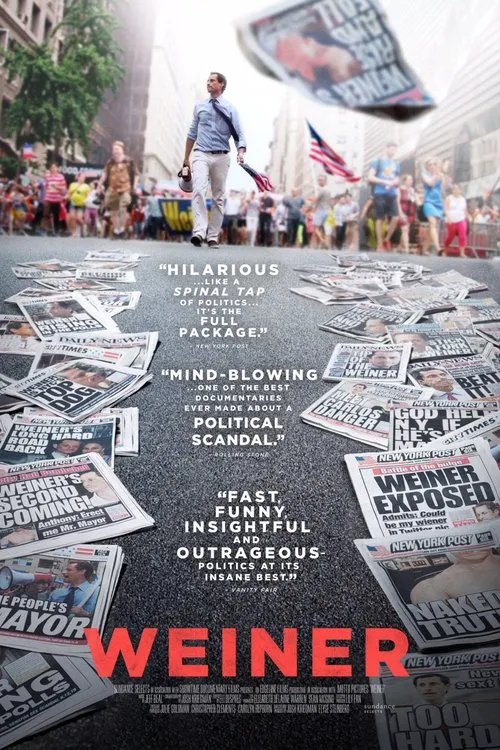Weiner

Plot
Weiner is a documentary film directed by Josh Kriegman and Elyse Steinberg that delves into the 2013 mayoral election in New York City, specifically focusing on the campaign of Anthony Weiner, a former congressman from New York's 9th congressional district. The film offers an unflinching, behind-the-scenes look at Weiner's efforts to revive his political career after a sexting scandal that led to his resignation from Congress. The film begins by reiterating the details of Weiner's scandal, which started in 2011 when it was revealed that the congressman had sent explicit images and messages to several women via Twitter. The scandal led to his resignation from Congress, amidst a cloud of public shame and embarrassment. Despite this, Weiner remains determined to revive his career in politics, and he announces his decision to run for mayor of New York City. Weiner's campaign is built around a mix of charm and arrogance. He presents himself as a progressive Democrat who genuinely cares about the people of New York City, but he is also quick to point out his accomplishments as a congressman, such as securing government funding for the 9th district. However, his past misdeeds continue to haunt him, and the film captures the struggles he faces in trying to keep his personal life out of the spotlight. One of the key dynamics of Weiner's campaign is his relationship with his wife, Huma Abedin. Abedin, a former aide to Hillary Clinton, is portrayed as a stoic and intelligent woman who tries to keep the focus on Weiner's policy initiatives rather than his personal demons. Despite her efforts, Weiner's past continues to plague the campaign, with many Democrats and Republicans alike questioning his ability to serve as mayor. Throughout the film, Kriegman and Steinberg capture Weiner's campaign in a series of intimate and revealing moments. We see Weiner on the campaign trail, speaking to voters and shaking hands, but we also see him behind the scenes, arguing with his aides about social media strategy and struggling to connect with his team. These moments offer a rare glimpse into the world of politics, where the facade of charisma and charm is often at odds with the raw emotion and tension that lies beneath. One of the most compelling aspects of the film is its portrayal of Weiner's inner circle, a group of passionate and devoted aides who are willing to overlook Weiner's past for the sake of his campaign. These aides, led by Weiner's campaign manager, Danny Kanner, are willing to do whatever it takes to help Weiner win the election, even if it means keeping his past transgressions a secret. However, not all of Weiner's aides are willing to overlook his past. Some of his advisors argue that Weiner's personal life is too much of a liability, and that he should focus on rehabilitating his image rather than running for office. These differing opinions create tension within the campaign, as Weiner's inner circle tries to navigate the delicate balance between maintaining their candidate's image and addressing the elephant in the room. The film also delves into the broader implications of Weiner's campaign, suggesting that our culture of shame and redemption is more complex than we often give it credit for. Weiner's campaign is both a reflection of and a commentary on our society's obsession with scandal and redemption. We are fascinated by Weiner's downfall, but we are also torn between our desire to forgive and our need to hold him accountable. Ultimately, Weiner's campaign ends in disaster. Despite a strong start, Weiner's numbers begin to slide, and he falls to 5th place in the polls. The film culminates with Weiner announcing his withdrawal from the campaign, a decision he takes with a mix of relief and anger. The film concludes with a meditation on the meaning of Weiner's campaign. Did he fail because of his past, or did he fail because of his inability to connect with his constituents? The answer is complex, reflecting the nuances of human nature and the ever-shifting landscape of politics. Weiner is a fascinating and thought-provoking documentary that sheds light on the complexities of politics, the power of redemption, and the human condition. By offering an intimate and unflinching look at Anthony Weiner's campaign, the filmmakers raise questions about our culture of shame and redemption, and whether we can ever truly put our past behind us.
Reviews



